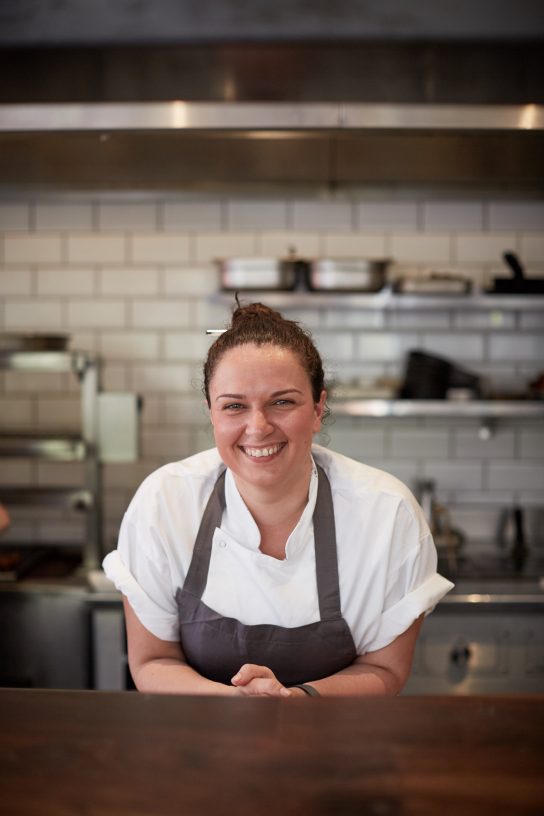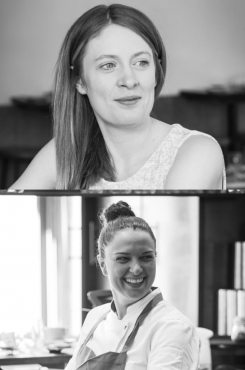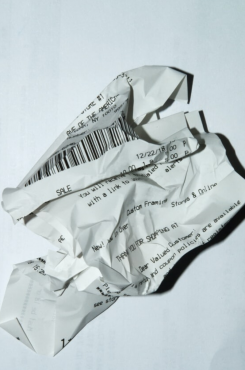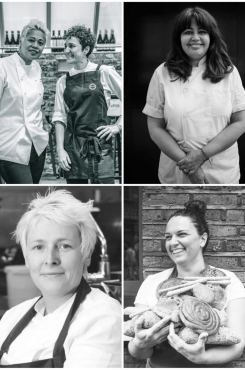CODE Meets Selin Kiazim
Published 16 December 2021
by Sam Selwood

When we got the chance to meet Oklava founder Selin Kiazim to chat about her new book, THREE, I snatched at the chance. Full disclosure – I used to work for Selin before I joined the CODE team, and in just under a year Selin and her team changed my perspective on food, cooking and the hospitality industry completely. Hearing that THREE was going to be about putting some of those lessons down on paper made me excited to meet for a catch-up to find out more.
Good to see you chef! It’s been a while now, how have you been since I last saw you and ‘the bad things happened’?
You mean the pandemic? Yeah, you know it was obviously a difficult time, having to close the restaurant, the ‘pingdemic’, the staffing shortages – we’re no exception to that and we are still having to deal with the repercussions of it. It’s all felt quite ‘yoyo-y’ in that one minute everything seems fine and the next minute everything falls of a cliff and goes wrong. But we push on.
I guess what I’m trying to say is, I’m fine! Even having been through that, you can’t wallow in it, you’ve got to move forward. It’s good to try and look at the positives. When I think of where my life is now and the changes we’ve put in as a team here, they just wouldn’t have happened otherwise. You know everything stops all of a sudden and you’ve got that time to reflect, so that’s what we’ll try to take from it. We just hope that there isn’t another lockdown, but then again we’ve said that quite a few times before haven’t we?!
Yes we have. You mentioned the industry staffing problems that we’re all too aware of at the moment, how are you managing your way through it?
I mean really, just by restricting our opening hours to fit what we’ve got.
I think it’s a balance though, you’re obviously keen to make back money you lost over the closures, but you need people to do that. So you need to think about things like possibly opening on days you were closed in the past, but then weighing that up against being able to give your team the benefit of that time off each week. At the moment we’re only one service short of the hours we ran pre-pandemic.
True, you need to look after the people you’ve got don’t you? I noticed Jojo who was a KP when I worked for you, running the Pide section when I ate here a few weeks ago – that was so good to see.
Yes the team have been brilliant, and Jojo’s incredible – we have such a great relationship. He trusted me for years when I said I’d try to get him into the kitchen and it took a bit longer than we thought. He’s an absolute dough pro now though!
I’m in a very very fortunate position I have the incredible Cokee too, our prep chef who’s an absolute machine – only doing day shifts but she’s been with us for years so on days when we’re closed she comes in and does prep. I wouldn’t do that with anyone else but I trust her completely and she’s like our secret weapon.
Have you had any successful hires then and how did you find them?
We’ve hired someone new so we were really lucky to find them after like weeks of setting up trials and people not showing up. You just want them to show up so you can see what they’re like, show them what we offer as a place to work etc.
We did try a few of the agencies earlier in the year. This one though we advertised through our own social media and this person got in touch – I guess we’re lucky we’ve got a good following.
Onto the book. So your first, the Oklava cookbook, came out four years ago. Can you tell us a little about how you approached your new one?
Well for that one, the first, the publishers approached me before we’d even opened the restaurant. I thought I wanted to make a bit more of a name for myself so I’ll hold off, we’d just done pop-ups until then. Then about a month or two after we opened they came back and said ‘sign this deal’ haha. So yeah I’d be here day and night, working and writing at the counter… it was intense. Oh and they gave me quite a tight deadline.
Okay, so the circumstances that led to your new book couldn’t really have been more different, could they? Everything shut down, all that free time…
Exactly! I knew I wanted to write another one and just had no excuse not to when lockdown happened.
Although it’s not just what was going on, you approach these things differently when you’ve had some experience too. So much of what we do isn’t necessarily about the food, wine and service, lots of it is about knowing the right people, doing the right things, getting yourself out there in different ways and social media is obviously a huge tool now. This’ll make you laugh – when that cookbook came out four years ago we were having a meeting with the publishers and they said, ‘we really think you should have your own Instagram now’ and I really didn’t want to. I was quite anti-it back then.
The Oklava cookbook focused on Turkish recipes and some of your grandmother’s methods, whereas THREE seems to be more about your own processes?
I mean it wasn’t that easy – it was probably the least inspirational time of my life but lots of these dishes were things I’ve cooked over the years so they were all ready. You know you can’t just fling recipes at a book, you’ve got to put the thought behind where you’re going with it. Basically though I just love food and I love cooking, and when I’m at home I’ll cook just what I fancy. When I shop for food I just buy things, without thinking what I’ll do with them and I guess over lockdown I started thinking about those people who are maybe confident cooking a handful of favourites like ‘my lasagne’ but then what about the rest of the time? I wanted to write something that gives them the tools and the confidence to just open up the cupboards and riff.
Ok so it’s more about the principles to bear in mind?
Yeah it was in those thoughts that THREE was born – I realised I look for three qualities when I’m doing that – Acid, Texture and Contrast. I don’t consciously think that way it’s just what comes naturally to me. I knew early on I didn’t want to just write another cookbook with a load of chicken recipes – it had to be something different. Also trying to remember home cooks who love sticking to a recipe to the letter, I’ve been really explicit in giving people lots of alternatives so no one is put off trying.
Lastly, I wanted to ask about service charge. You announced you’d be getting rid of it when everything started opening again after the first lockdown. We just wondered how that’s been going and if you’ve had any challenges or successes you want to share?
Laura (Christie; co-founder) and I had many discussions after that first lockdown, one of the things we told ourselves was ‘none of us saw that coming, there’s no rule book any more, we need to just do what’s right for us’.
Ultimately what it comes down to is that in no other industry do staff have a discretionary part of their pay. For instance if you work in a shop and someone isn’t totally happy with your customer service maybe because you’re just having a bad day, you don’t get your pay docked so why should that be? It’s an outdated system but I understand why some people need to use it, like national insurance relief you get on the Tronc system makes a massive difference for some businesses, especially for restaurants with multiple sites.
I overheard a couple in a restaurant the other day commenting on the 12.5% discretionary service charge being added to their bill, as if that was new too!
I think that’s the thing, if you asked five random people what they think service charge actually is – not the amount it should be but what it exists for, you’ll get 5 different explanations.
For me it’s like front of house are held to ransom every day over an essential part of their pay, it creates a feeling that a waiter is only being nice because they want their tip. No! It’s actually their job, people’s careers.
We need to get it right if we’re going to move on to think of hospitality as a real career, a lot of people work in it because they have a great passion for the industry and they love food and wine and want to give people a great time. That is a highly-skilled job and they shouldn’t be made to feel like they’re begging for a tip.
It’s just so established though isn’t it?
Obviously it’s still very much a part of our industry and I’m sure it will be discussed for many years. For us though, it’s become a complete non-topic, because our customers know what’s going on when they come, our staff were all briefed, are behind it and they appreciate it. I’m hopeful that more and more restaurants will get on board, but you have to do what’s right for your business.




